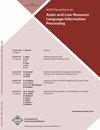Analyzing the Effects of Transcription Errors on Summary Generation of Bengali Spoken Documents
IF 1.8
4区 计算机科学
Q3 COMPUTER SCIENCE, ARTIFICIAL INTELLIGENCE
ACM Transactions on Asian and Low-Resource Language Information Processing
Pub Date : 2024-07-17
DOI:10.1145/3678005
引用次数: 0
Abstract
Automatic speech recognition (ASR) has become an indispensable part of the AI domain, with various speech technologies reliant on it. The quality of speech recognition depends on the amount of annotated data used to train an ASR system, among other factors. For a low-resourced language, this is a severe constraint and thus ASR quality is often poor. Humans can read through text containing ASR-errors, provided the context of the sentence is preserved. Yet in cases of transcripts generated by ASR systems of low-resource languages, multiple important words are misrecognized and the context is mostly lost; discerning such a text becomes nearly impossible. This paper analyzes the types of transcription errors that occur while generating ASR transcripts of spoken documents in Bengali, an under-resourced language predominantly spoken in India and Bangladesh. The transcripts of the Bengali spoken document are generated using the ASR of Google Cloud Speech. The paper also explores if there is an effect of such transcription errors in generating speech summaries of these spoken documents. Summarization is carried out extractively; sentences are selected from the ASR-generated text of the spoken document. Speech summaries are created by aggregating the speech-segments from the original speech of the selected sentences. Subjective evaluation shows the ‘readability’ of the spoken summaries are not degraded by ASR errors, but the quality is affected due to the reliance on intermediate text-summary containing transcription errors.分析转录错误对孟加拉语口语文件摘要生成的影响
自动语音识别(ASR)已成为人工智能领域不可或缺的一部分,各种语音技术都依赖于它。除其他因素外,语音识别的质量取决于用于训练 ASR 系统的注释数据量。对于资源匮乏的语言来说,这是一个严重的制约因素,因此 ASR 的质量往往很差。只要保留句子的上下文,人类就可以阅读包含 ASR 错误的文本。然而,在低资源语言的 ASR 系统生成的转录文本中,多个重要单词被错误识别,上下文大部分丢失;要辨别这样的文本几乎是不可能的。本文分析了在生成孟加拉语口语文档 ASR 转录本时出现的转录错误类型,孟加拉语是一种资源匮乏的语言,主要在印度和孟加拉国使用。孟加拉语口语文档的转录本是使用谷歌云语音的 ASR 生成的。本文还探讨了在生成这些口语文档的语音摘要时,此类转录错误是否会产生影响。摘要是以提取方式进行的;从 ASR 生成的口语文档文本中选取句子。从所选句子的原始语音中汇总语音片段,创建语音摘要。主观评估表明,口语摘要的 "可读性 "不会因 ASR 错误而降低,但由于依赖包含转录错误的中间文本摘要,其质量会受到影响。
本文章由计算机程序翻译,如有差异,请以英文原文为准。
求助全文
约1分钟内获得全文
求助全文
来源期刊

ACM Transactions on Asian and Low-Resource Language Information Processing
Computer Science-General Computer Science
CiteScore
3.60
自引率
15.00%
发文量
241
期刊介绍:
The ACM Transactions on Asian and Low-Resource Language Information Processing (TALLIP) publishes high quality original archival papers and technical notes in the areas of computation and processing of information in Asian languages, low-resource languages of Africa, Australasia, Oceania and the Americas, as well as related disciplines. The subject areas covered by TALLIP include, but are not limited to:
-Computational Linguistics: including computational phonology, computational morphology, computational syntax (e.g. parsing), computational semantics, computational pragmatics, etc.
-Linguistic Resources: including computational lexicography, terminology, electronic dictionaries, cross-lingual dictionaries, electronic thesauri, etc.
-Hardware and software algorithms and tools for Asian or low-resource language processing, e.g., handwritten character recognition.
-Information Understanding: including text understanding, speech understanding, character recognition, discourse processing, dialogue systems, etc.
-Machine Translation involving Asian or low-resource languages.
-Information Retrieval: including natural language processing (NLP) for concept-based indexing, natural language query interfaces, semantic relevance judgments, etc.
-Information Extraction and Filtering: including automatic abstraction, user profiling, etc.
-Speech processing: including text-to-speech synthesis and automatic speech recognition.
-Multimedia Asian Information Processing: including speech, image, video, image/text translation, etc.
-Cross-lingual information processing involving Asian or low-resource languages.
-Papers that deal in theory, systems design, evaluation and applications in the aforesaid subjects are appropriate for TALLIP. Emphasis will be placed on the originality and the practical significance of the reported research.
 求助内容:
求助内容: 应助结果提醒方式:
应助结果提醒方式:


